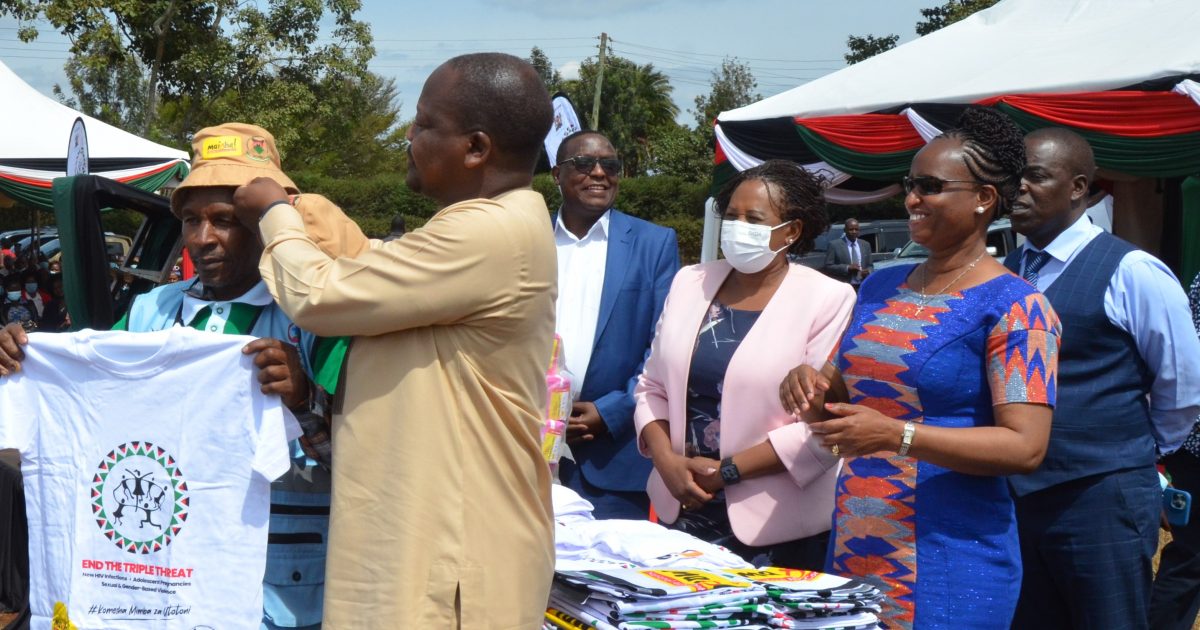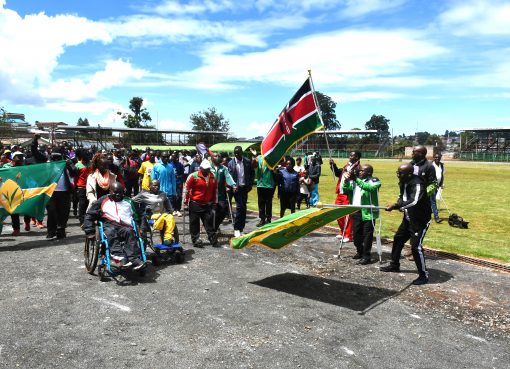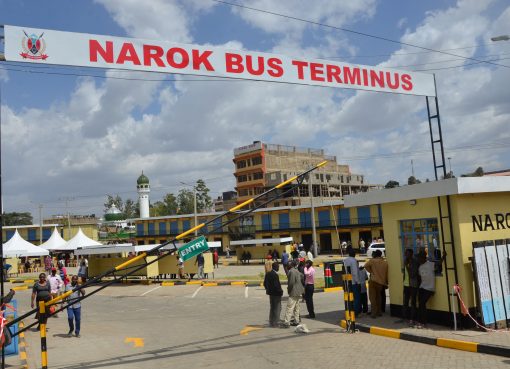Health Cabinet Secretary Mutahi Kagwe Wednesday launched a community sensitization forum, aimed at addressing the Triple Threats facing adolescents.
The forum at the Wambugu Farm in Nyeri County, was organized by the National Aids Control Council (NACC), Ministry of Ministry of Health, Ministry of Interior and Coordination of National Government, National Council for Population Development and the County Government of Nyeri.
It drew attendance from Community Health Volunteers and Nyumba Kumi elders amongst other community gatekeepers, to chart the way forward on tackling the increasing rates in teenage pregnancies, Gender-Based Violence and HIV infections amongst adolescents through a campaign dubbed, ‘Komesha Mimba za Utotoni.’
According to statistics from NACC, Kenya has the third highest teen-pregnancy rate in the world with approximately 80 births per 1000 births.
The Council has also listed poverty, lack of sexual reproductive health education and sexual abuse as the key drivers of the Triple Threat.
In his address Wednesday, Kagwe noted that there was a correlation between teenage pregnancies, Gender-Based Violence (GBV) and the new HIV infections.
He challenged the community gate keepers to play their role in mentoring adolescents. Kagwe said that most of the teenagers were falling trap to the triple threat due to lack of guidance from their parents.
“Teenage pregnancy must stop. Women should start advising young girls and urging them to take care of themselves. It is also time for us men to start perceiving these girls as our children not as our potential wives, so that it becomes easy for us to give them advice,” said Kagwe.
Statistics from the Ministry indicate that between January and May this year, health facilities in the country recorded 109,110 antenatal care visits from adolescents.
Out of these, 720 were from Nyeri County. Overall the figures show that in 2019 and 2021, Nyeri County recorded a 59 per cent increase in the number of teenage girls attending ante-natal care.
The data also shows that there has been an 85 per cent increase in sexual and GBV cases reported among adolescents aged between 10 and 17 years in the past five years.
2,466 cases were recorded in health facilities in 2016, 16,476 GBV cases amongst teenagers were recorded in 2021.Out of this number, 562 were from Nyeri County.
Further, between January and May this year, the County has reported that 105 adolescents aged between 10 and 17 had encountered sexual and GBV, with the health CS calling for stiffer punishment to be meted on the offenders.
He said that there was a tendency to show leniency on the perpetrators who continued to roam freely while children as young as ten are burdened with the responsibility of becoming mothers.
“We cannot continue like this. It is not possible. You cannot tell that the human rights of an individual who has raped a 10-year-old girl. What human rights are those? This is similar to taking a beast to a court,” he said.
It is estimated that out of the 1.4 million Kenyans living with HIV in Kenya 78,465 are children between the age of zero to 14 years. In Nyeri, 20,233 people are living with the virus out of whom 1,435 are adolescents below 20 years.
The County recorded 226 new infections in 2021, with Mathira West Sub-county leading with the highest infection rates.
Health Principal Secretary, Susan Mochache, said that it was alarming that 51 per cent of the new HIV infections in the country were among children between the age of 9 and 20 years.
Mochache noted that the Triple Threat risked compromising the gains already achieved in the fight against HIV and there was a risk in increasing the burden of responsibility for the government which is currently spending Sh 25 billion in managing the virus.
Mochache emphasized on the need for sensitization of the youth about the dangers of contracting the HIV virus.
“51 per cent of the new HIV infections recorded are children between the age of 9 and 20 years. This means that out of the 32,000 new infections, 16,000 are children.
The money that was previously spent by Community Health Volunteers to conduct awareness in the community has been channeled towards managing HIV.
Once one gets infected it means that the government has provide you with ARV throughout your lifetime. It is our responsibility to ensure that these numbers do not go high,” she said.
By Wangari Mwangi and Kiama Wamutitu





